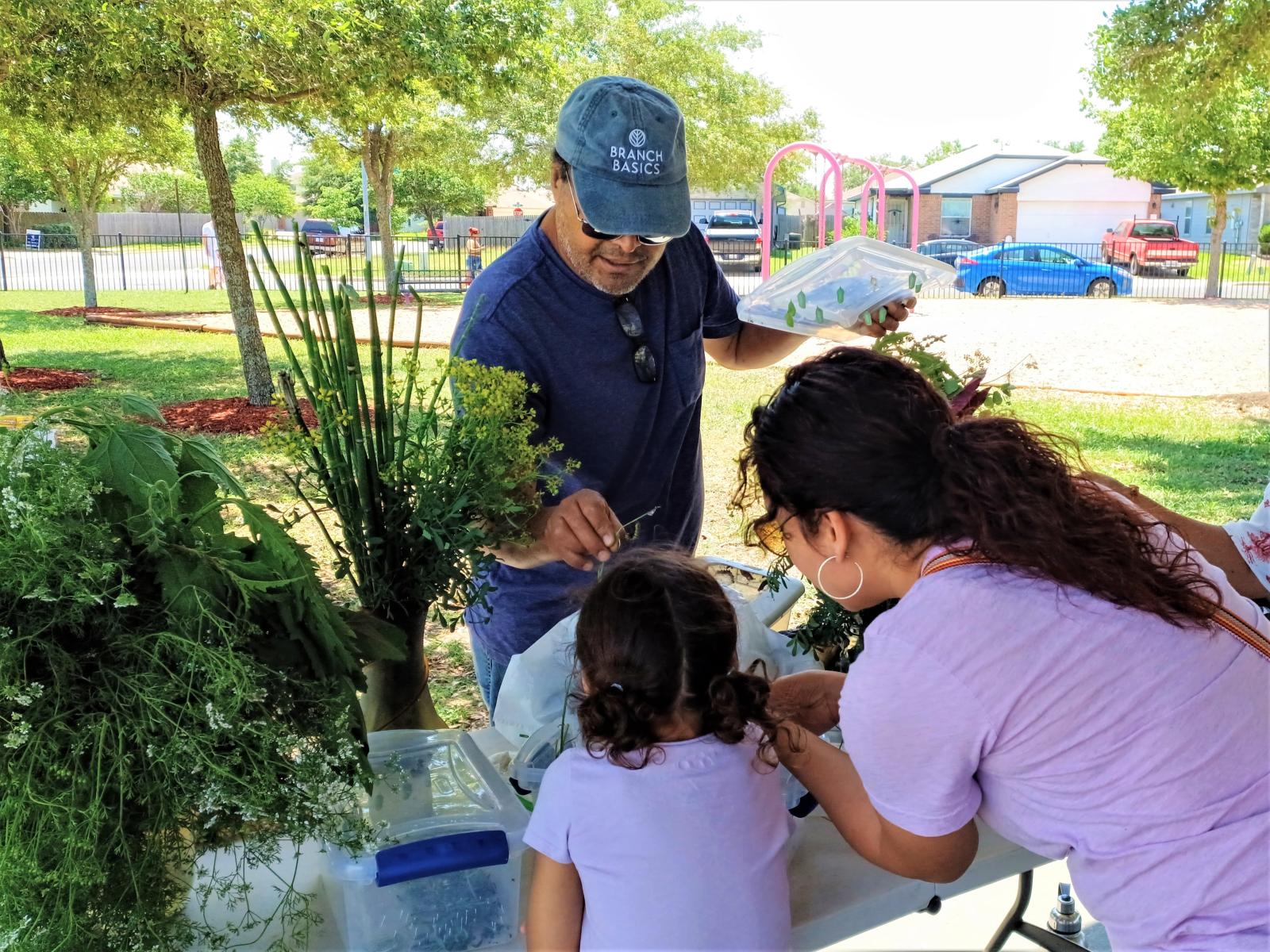
It was a gorgeous spring day—sunny, blue skies, light breeze—perfect for an afternoon at the park with family, friends, and neighbors. Members of the Del Valle community in southeast Austin had gathered at Los Cielos Park to commemorate Earth Day and celebrate exciting first steps. There was the requisite family-friendly fun—music, prize drawings, face-painting, cookies—but there was also serious business to discuss: namely, how to revitalize an abandoned community garden and build momentum toward developing other garden projects, and possibly a food forest, in the area.
Del Valle is considered a food desert, meaning that its 25,000-plus residents, many of whom live below the poverty line, have limited access to a variety of healthy and affordable food. Despite being home to several major economic and infrastructural hubs, including Tesla’s new 2,500-acre Gigafactory and the Circuit of the Americas (COTA), Formula 1’s U.S. Grand Prix racetrack, there are no grocery stores within reasonable driving distance. The nearest H-E-B is 7 miles away; the nearest Fiesta Mart, nearly 10. Residents without cars have to buy groceries at the local dollar or convenience stores, which have higher prices and fewer healthful options, especially fresh produce.
That’s where events like this one come in. Food forests and community gardens yield more than just organic, locally grown produce; they also create opportunities to connect with neighbors, spend time outdoors, and build community resilience. “People think a garden project like this is just about the plants, but it’s as much about the people in our community,” said Valerie Chavez-Hernández, a new member of the Whole Communities–Whole Health (WCWH) Community Strategy Team (CST) and co-organizer of the event.
Much like Earth Day itself—which has blossomed from a few peaceful demonstrations in 1970 into an annual event with more than a billion participants worldwide—WCWH’s event represents the start of something the organizers hope grows larger, both literally and figuratively. “What we're doing with events like this is trying to create momentum, give people a connection,” said Ellena Gonzalez, another CST member and event co-organizer.
The focal point of the event was a workshop for adults on launching a neighborhood food forest or community garden, hosted by leaders from Fruitful Commons, a WCWH partner and local nonprofit that supports community agriculture projects. Topics ranged from everyone’s favorite gardening-related memories to residents’ visions and suggestions for bringing local projects to fruition.
“What we're doing with events like this is trying to create momentum, give people a connection.” - Ellena Gonzalez, Community Strategy Team
Whole Communities–Whole Health (WCWH), one of UT Austin’s three Grand Challenges, is a community-centered cohort study seeking to better understand how biology, the environment, and physical and emotional health (both protective factors and adversity) affect the health of families facing systemic injustice. By ensuring that members of the community are active participants in the research process, the aim is to change the traditional methodological framework for conducting research so that a study’s findings have the potential to benefit participants quickly and directly.
WCWH is focused on conducting community-centered research, meaning the volunteers at the heart of the study are not mere “subjects,” but rather participants who are “connected in a grassroots way,” as Gonzalez put it. “In these areas where they’re doing the research with families, folks are working two or three jobs, so it's hard to keep up with what's happening locally, or in their neighborhood,” she said. "But the researchers from UT Austin have put in a great deal of time and effort to make sure they engage.”
The idea is to redefine the research approach by providing potentially actionable data back to the participants, as well as being cognizant of the obstacles that frequently exclude some groups from research studies. One such obstacle in some communities can be language, which is why WCWH provided interpreters for Spanish-speaking participants at the Earth Day event. “I feel like UT Austin, with this particular research, has gone to great lengths to avoid simply taking from the community without some sort of give-back,” Gonzalez said of WCWH’s community-centered research approach. “The bilingual, user-friendly smart-phone app the study participants use has been particularly helpful,” she said.
Gonzalez and Chavez-Hernández were recruited to the Community Strategy Team (CST) through their primary engagements with the community. Gonzalez, a local doula and yoga therapist, has worked with WCWH for several years; she connected with WCWH when she worked with Mama Sana Vibrant Woman, a nonprofit collective that provides free pregnancy and postpartum support to women of color in Travis County. Chavez-Hernández recently joined the CST thanks to a WCWH representative who learned about her work as a Del Valle Middle School instructional aide teaching kids about gardening, composting, and nutrition.
“Del Valle is hopeful,” Gonzalez said. “We're an area that's hopeful to move from food desert to food forest. These events are the early steps.”
Chavez-Hernández echoed Gonzalez’s optimism. “We’ll get it there,” she said of the project. “At first they said it was the plants we needed. So, they got the plants, and they got this plot. Now I honestly think it’s just the people and the motivation. Once you get people motivated, you can move mountains.”

